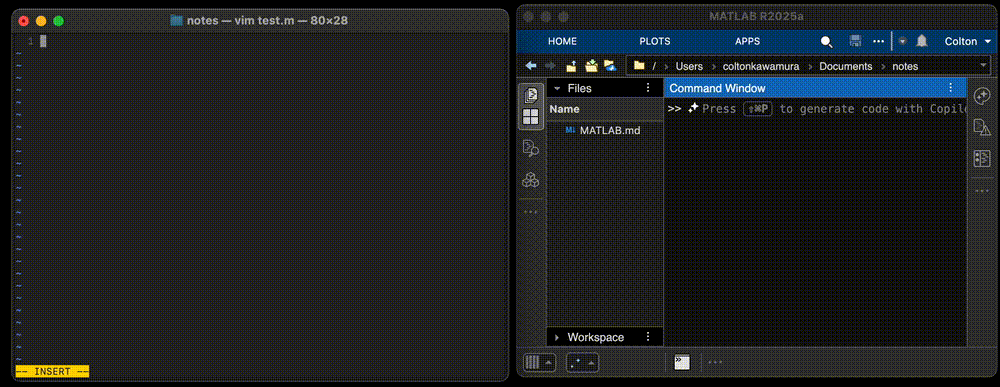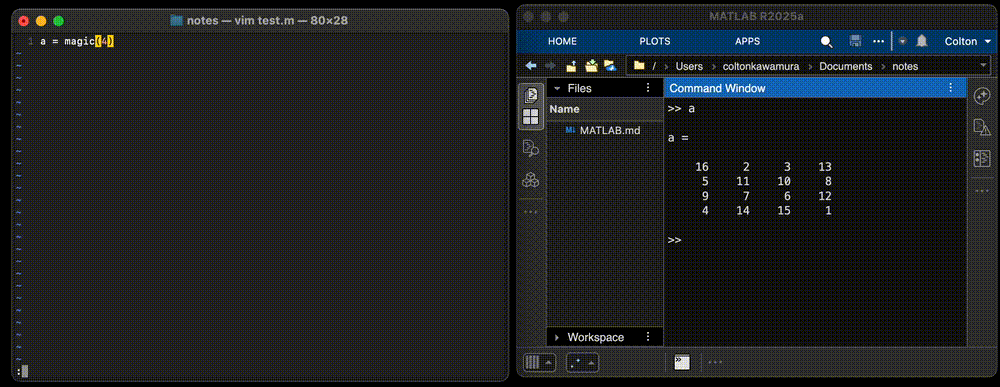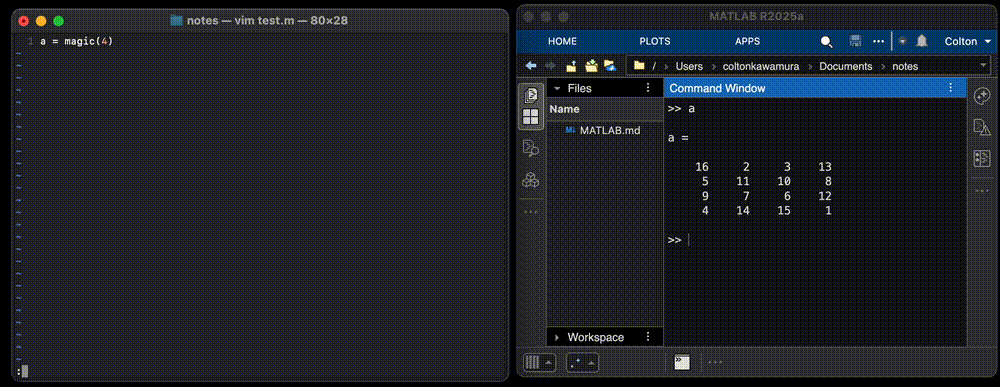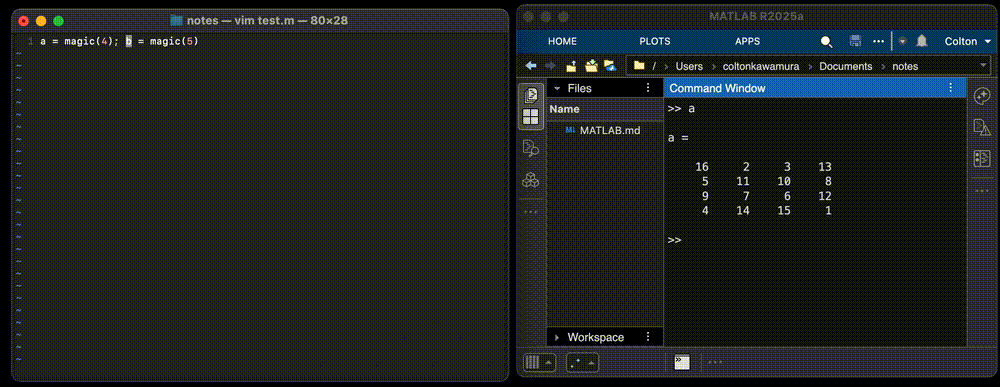How to Use VIM and MATLAB
This method only requires MATLAB (2015b or later), VIM, and python. No external libraires needed.
How to run with VIM
MATALB and VIM can be joined together with MATLAB’s native python engine. I rolled my own to keep everything lightweight.
Enable MATLAB Engine Sharing via Python
First we build a path that points to where MATLAB stores the python engine.
cd(fullfile(matlabroot,'extern','engines','python'))
So if matlabroot is Applications/MATLAB_R2025a.app, then you’ll be in ‘/Applications/MATLAB_R2025a.app/extern/engines/python’ after this cd
Next, we take MATLAB’s engine and we install it into our local python3.
system('python3 -m pip install .')
Note:
When I did this, I got an error that said this:
ERROR: Failed building wheel for matlabengine
[?25hFailed to build matlabengine
ERROR: Could not build wheels for matlabengine which use PEP 517 and cannot be installed direct
What I did to resove is that I had to upgrade wheel and setuptools with
python3 -m pip install --upgrade pip setuptools wheel
That this point, there is no need to redo these steps.
Share the Engine with Python
Now, in MATLAB enter
matlab.engine.shareEngine('VIM')
This names the MATLAB session VIM.
The next step is creating a helper script which we’ll name sendMATLAB.py:
#!/usr/bin/env python3
import sys
import matlab.engine
def main():
code = sys.stdin.read()
try:
eng = matlab.engine.connect_matlab('VIM')
eng.eval(code, nargout=0)
except Exception as e:
print(f"[ERROR] MATLAB exception: {e}", file=sys.stderr)
if __name__ == '__main__':
main()
This takes whatever is sent to the system and ends it to the engine. The nargout=0 makes it so it doesn’t expect a return.
Now make it executable
chmod +x sendMATLAB.py
VIM Mapping
Now add this to ~/.vimrc
" 1) Define the path to your Python helper
let g:matlab_engine_script = '/Users/your/path/sendMATLAB.py'
function! SendMatlabLine() abort
let l = getline('.') "get the current line in the buffer (line on your MATLAB file)
" take the buffer line (the line in MATLAB) and pipe into our python script which sends to MATLAB
" 2>&1 redirects stderr to stdout so both errors and normal outputs are captureed
" shellescape makes sure the line and teh script path avoids errors with weird characters
let cmd = 'echo ' . shellescape(l) . ' | python3 ' . shellescape(g:matlab_engine_script) . ' 2>&1'
"whatever comes back from MATLAB will get captured
let output = system(cmd)
" if the shell command failed, we get v:shell_error = failure and lets us see the error
if v:shell_error
echohl ErrorMsg " grab any errors, could also expand to WarningMsg maybe
echo output
echohl None "resests the highlight group back to nomal
else
"if everything went well, prints our result
echo output
endif
endfunction
" same thing as above but just the highlighted porting in visual mode
function! SendMatlabSelection() abort
let lines = getline("'<", "'>") "this is waht grabs visual mode
let cmd = 'python3 ' . shellescape(g:matlab_engine_script) . ' 2>&1'
let output = system(cmd, lines)
if v:shell_error
echohl ErrorMsg
echo output
echohl None
else
echo output
endif
endfunction
" map our functions to <leader>me
nnoremap <silent> <leader>me :call SendMatlabLine()<CR>
xnoremap <silent> <leader>me :<C-U>call SendMatlabSelection()<CR>
command! -nargs=+ Mat call SendToMatlab(<q-args>)
function! SendToMatlab(cmd) abort
let code = a:cmd . "\n"
let shellcmd = 'echo ' . shellescape(code) . ' | python3 ' . shellescape(g:matlab_engine_script)
let output = system(shellcmd)
if v:shell_error
echohl ErrorMsg | echo substitute(output, '\n\+$', '', '') | echohl None
else
echo substitute(output, '\n\+$', '', '')
endif
endfunction
Above, we define three functions. SendMatlabLine let’s us send the whole line in normal mode to MATLAB. SendMatlabSelection only sends what we highlight in visual mode, and SendToMatlab allows us to send a command via user defined commands.
Now save this and watch it in action!
For SendMatlabLine we call send with <leader>me:

Write commands outside of the file with SendToMatlab:

Everything also works for figures!

Send just the highlighted portion in visual mode with SendMatlabSelection:

Please let me know if you come up with anything more!
Enjoy Reading This Article?
Here are some more articles you might like to read next: